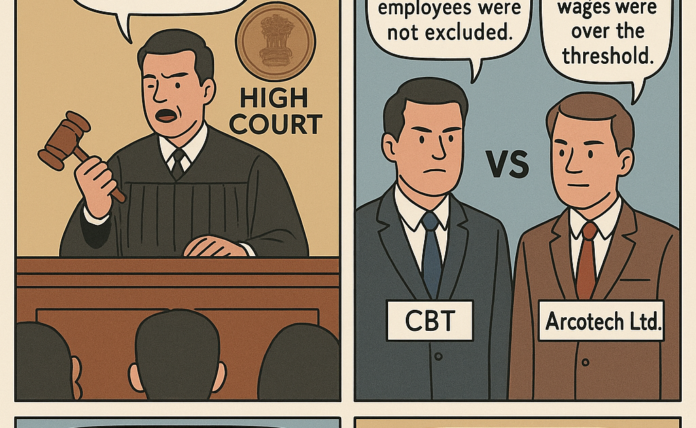[ad_1]
Abstract:
This paper analyzes the legal reasoning and social welfare implications behind the Punjab and Haryana High Court’s dismissal of an appeal by the Employees Provident Fund Organization (EPFO) against Arcotech Ltd. The case revolved around whether employees drawing wages above the statutory threshold prior to 2014 could be deemed excluded from provident fund contributions. The Court reaffirmed employer autonomy in wage structuring, balancing statutory mandates with the principles of beneficial legislation.
1. Introduction
The Employees Provident Fund and Miscellaneous Provisions Act, 1952 (“EPF Act”) is a pivotal piece of Indian labour welfare legislation. Its purpose is to ensure financial security for employees post-retirement. However, the applicability of the Act is subject to wage thresholds and exemptions. The judgment in Central Board of Trustees, EPFO vs Arcotech Ltd. provides insight into how Indian courts address exclusion cases under the EPF Act and balance the legislative intent with employer prerogatives.
2. Case Background
The appeal was filed by the Central Board of Trustees (CBT), EPFO, against Arcotech Ltd., challenging a previous judgment by the Single Judge of the High Court, which upheld the decision of the Central Government Tribunal-cum-Labour Court-II, New Delhi. The Tribunal had set aside the EPFO’s earlier order that directed the employer to make retrospective contributions under the EPF Act.
Key facts:
-
The dispute involved 59 employees whose basic wages exceeded ₹6,500/month prior to the notification dated 28.08.2014.
-
EPFO contended that these employees should have been covered under the EPF Act.
-
The Tribunal and Single Judge held that they were “excluded employees” under the Act as their wages exceeded the threshold, and that no retrospective liability existed.
3. Legal Issues
The core legal issues in the case were:
-
Whether the employees drawing more than ₹6,500 in basic wages prior to 01.09.2014 were rightly classified as excluded employees.
-
Whether the EPFO can direct employers to structure salaries in a manner to bring employees under EPF coverage.
-
Whether the order by the Single Judge ignored applicable Supreme Court precedent.
4. Court’s Reasoning
Justice Sudhir Singh and Justice Sukhvinder Kaur dismissed the appeal on the following grounds:
-
Excluded Employees: The Court upheld that employees with basic wages above the statutory threshold (₹6,500/month) were rightly treated as excluded employees prior to 01.09.2014. No mandatory contribution was required from employers for such individuals under the EPF Act before the amended wage threshold came into effect.
-
No Authority to Mandate Salary Structure: The Court rejected EPFO’s implicit claim that it could direct employers to fix wages in a specific manner to bring employees under the EPF net. There exists no statutory authority empowering EPFO to dictate salary structure.
-
No New Legal Grounds Raised: The Court held that the grounds raised in the appeal had already been adjudicated by the Single Judge and the Tribunal, and no new material or legal error was presented to warrant interference.
-
Precedent Distinction: EPFO’s reliance on RPFC vs Shibu Metal Workers (1964-65 FJR 491) was held inapplicable, as the facts materially differed from the present case.
5. Legal Significance and Analysis
This case reaffirms several important legal principles:
-
Doctrine of Exclusion: The judgment strengthens the interpretation of “excluded employees” under para 2(f) of the EPF Scheme, 1952, reinforcing the wage-based cutoff as a decisive factor.
-
Employer Autonomy: The Court acknowledged that employers retain discretion in structuring wages, as long as they operate within statutory limits.
-
Non-Retrospective Application: There was clear affirmation that retrospective application of beneficial legislation must be explicitly provided for. In the absence of such provision, liability cannot be foisted backward.
-
Limits of Beneficial Construction: While the EPF Act is beneficial legislation, the Court cautioned against overly liberal interpretation that distorts statutory scheme and employer rights.
6. Conclusion
The Punjab and Haryana High Court’s decision in CBT vs Arcotech Ltd. delineates the contours of provident fund coverage and clarifies employer obligations under the pre-2014 wage regime. It is a reminder that while social welfare goals are paramount, legal clarity and predictability for employers must not be compromised. The case sets a precedent for similar exclusion-based litigation, ensuring EPFO actions remain within the statutory framework.
[ad_2]
Source link


